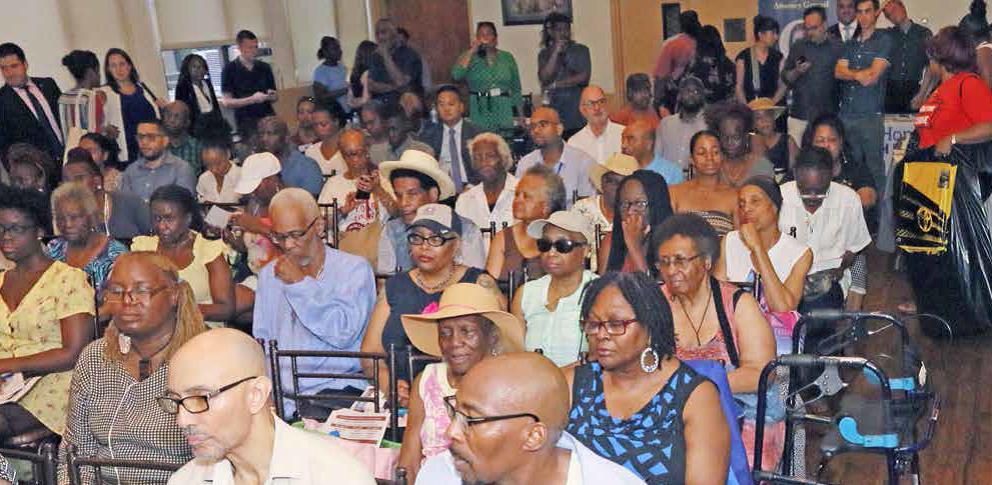featured
Fight on the Homefront Grows: Tish Town Hall on Real Estate Fraud, Deed Theft Packed


Bed-Stuy residents braved the heatwave to pack the house at the Real Estate and Deed Theft Town Hall organized by AG Letitia James
and Cong. Hakeem Jeffries. (Inset): AG James is a reassuring presence for Mary Head, a member of Community Board # 3,
and a lifelong resident of Bedford-Stuyvesant.
New York State Attorney General Letitia James and Congressman Hakeem Jeffries hosted a town hall on deed theft and real estate property fraud at Brooklyn’s Restoration Plaza. The room was hot and so were the topics at the standing-room-only event.
The story goes that when asked why he robbed banks, 1930s bank robber Willie Sutton, is said to have responded, “Because that’s where the money is.” He denies saying it, but the story sticks because it speaks directly to the motivation. And the Bedford-Stuyvesant homeowners at the town hall and their elderly and disabled neighbors are targeted because that’s where the money is. They have hundreds of millions of dollars in equity, and this has made them “Ground Zero” for real estate fraud in New York.
And these robbers of property, “bad actors” as they are called, use a variety of means to make what is yours theirs.
Panelists Attorney General Letitia James; Congressman Jeffries; DA Eric Gonzalez; Travis Hill, Attorney General’s Office; Christie Peale, Center for NYC Neighborhoods; Richard Farrell, Brooklyn DA’s Office; and Jacqueline Griffin, Brooklyn Legal Services gave insights into how fraud is perpetrated and how to protect against it.
After opening statements by James and Jeffries, the panelists got into the nitty-gritty of real estate fraud, not only in Bedford-Stuyvesant, but across the city. Travis Hill, from the Attorney General’s Real Estate Fraud Division, enumerated four ways frauds are perpetrated. 1. False pretenses – Promises are made that cannot be kept. 2. Trickery – Have the homeowner think they’re signing a legitimate document when they are really signing over their deed. 3. Lifting signatures – Taking signatures from a previously signed document and transferring it to a deed, then taking your house. 4. Forgery – Just straight-up copying a signature and handing it to the clerk at the Registrar’s Office.
And do not count on the Registrar’s Office to spot a fraudulent deed. “It’s just a clearinghouse,” said Travis. “They don’t check legitimacy of the deeds.”
Beware of promises of “quick fixes,” and particularly be aware of “affinity marketing” a technique where a front person comes to you who speaks your language or looks like you, emphasizes a commonality and smiles and uses your trust in them to steal your house. There are really people like that, and like predators circling their prey, they will continue to attack. Travis suggests that homeowners regularly check their deed and sign up for the automatic notification system available.
Brooklyn District Attorney Eric Gonzalez noted that like the heat in the room, this neighborhood was a hot real estate market that was being targeted and that his office’s real estate fraud unit can be contacted when it is believed a fraud is being, or has been, perpetrated.
Jacqueline Griffin, from Brooklyn Legal Services, said to open the notices you receive. Open and read the mortgage statements, don’t assume what’s in them. “Everything about your house is public information,” said Griffin. The mortgage documents, bank actions, property taxes, emergency repairs,” all of it is easily available and can be used against the unaware homeowner. “Don’t let them know more about your house than you do.”.
Another technique is to contact distant relatives of a deceased person, telling them of the liability they have as part-owner of this person’s property. The interest in the property is purchased by the predator, and then presented to the other heirs, who demand that the property be “partitioned” and divided into shares.
If you get a foreclosure notice, do not panic. There is a time element, but there is enough time for you to seek help and act in your own best interests. Get your own lawyer. Do not use any lawyer a purchaser or anyone connected with the purchaser, recommends. And if you’re getting persistent calls, ADA Chris Farrell, with the Brooklyn DA’s Office, said don’t worry about being polite. He empowers you to tell them, ‘The District Attorney said I can hang up,’ and do so.
Get a copy of everything and get everything in writing. And do not count simply on a will to transfer property. “Wills get dicey,” as they have to go through Surrogate’s Court and the probate process. Better to put a known heir directly on the deed. That ensures the property is passed on without interruption or question.
The Center for NYC Neighborhoods has a hotline to call with any questions you may have about your home. [Hotline# is 855-HOME456]

